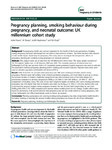Pregnancy planning, smoking behaviour during pregnancy, and neonatal outcome: UK millennium cohort study
| dc.contributor.author | Flower, A | |
| dc.contributor.author | SHAWE, JILL | |
| dc.contributor.author | Stephenson, J | |
| dc.contributor.author | Doyle, P | |
| dc.date.accessioned | 2017-10-05T10:36:27Z | |
| dc.date.available | 2017-10-05T10:36:27Z | |
| dc.date.issued | 2013-12 | |
| dc.identifier.issn | 1471-2393 | |
| dc.identifier.issn | 1471-2393 | |
| dc.identifier.other | 238 | |
| dc.identifier.uri | http://hdl.handle.net/10026.1/10012 | |
| dc.description.abstract |
<jats:title>Abstract</jats:title> <jats:sec> <jats:title>Background</jats:title> <jats:p>Pre-pregnancy health and care are important for the health of the future generations. Smoking during pregnancy has been well-researched and there is clear evidence of harm. But there has been little research on the health impact of planning for pregnancy. This study aims to investigate the independent effects of pregnancy planning and smoking during pregnancy on neonatal outcome.</jats:p> </jats:sec> <jats:sec> <jats:title>Methods</jats:title> <jats:p>This analysis made use of data from the UK Millennium Cohort Study. The study sample consisted of 18,178 singleton babies born in UK between 2000 and 2001. The neonatal outcomes of interest were low birthweight (<2.5 Kg) and pre-term birth (<37 completed weeks gestation). Logistic regression was used to estimate the association between pregnancy planning and/or smoking and neonatal outcome. Adjusted odds ratios were used to calculate population attributable risk fractions (PAFs).</jats:p> </jats:sec> <jats:sec> <jats:title>Results</jats:title> <jats:p>43% of mothers did not plan their pregnancy and 34% were smoking just before and/or during pregnancy. Planners were half as likely to be smokers just before pregnancy, and more likely to give up or reduce the amount smoked if smokers. Unplanned pregnancies had 24% increased odds of low birth weight and prematurity compared to planned pregnancies (AOR<jats:sub>LBW</jats:sub>1.24, 95% CI 1.04-1.48; AOR<jats:sub>PREM</jats:sub>1.24, 95% CI 1.05-1.45), independent of smoking status. The odds of low birth weight for babies of mothers who were smoking just before pregnancy was 91% higher than that of mothers who were not (AOR<jats:sub>LBW</jats:sub>1.91, 95% CI 1.56-2.34). Women who quit or reduced the amount smoked during pregnancy lowered the risk of a low birth weight baby by one third (AOR<jats:sub>LBW</jats:sub>0.66, 95% CI 0.51-0.85) compared with women whose smoking level did not change. Smaller effects were found for prematurity. If all women planned their pregnancy and did not smoke before or during pregnancy, 30% of low birthweight and 14% of prematurity could, in theory, be avoided.</jats:p> </jats:sec> <jats:sec> <jats:title>Conclusions</jats:title> <jats:p>Planning a pregnancy and avoiding smoking during pregnancy has clear, independent, health benefits for babies. Quitting or reducing the amount smoked during pregnancy can reduce the risk of low birthweight.</jats:p> </jats:sec> | |
| dc.format.extent | 238- | |
| dc.format.medium | Electronic | |
| dc.language | en | |
| dc.language.iso | eng | |
| dc.publisher | Springer Science and Business Media LLC | |
| dc.subject | Pregnancy planning | |
| dc.subject | Smoking | |
| dc.subject | Low birthweight | |
| dc.subject | Prematurity | |
| dc.title | Pregnancy planning, smoking behaviour during pregnancy, and neonatal outcome: UK millennium cohort study | |
| dc.type | journal-article | |
| dc.type | Journal Article | |
| plymouth.author-url | https://www.webofscience.com/api/gateway?GWVersion=2&SrcApp=PARTNER_APP&SrcAuth=LinksAMR&KeyUT=WOS:000329252300001&DestLinkType=FullRecord&DestApp=ALL_WOS&UsrCustomerID=11bb513d99f797142bcfeffcc58ea008 | |
| plymouth.issue | 1 | |
| plymouth.volume | 13 | |
| plymouth.publication-status | Published | |
| plymouth.journal | BMC Pregnancy and Childbirth | |
| dc.identifier.doi | 10.1186/1471-2393-13-238 | |
| plymouth.organisational-group | /Plymouth | |
| plymouth.organisational-group | /Plymouth/Faculty of Health | |
| plymouth.organisational-group | /Plymouth/Faculty of Health/School of Nursing and Midwifery | |
| plymouth.organisational-group | /Plymouth/REF 2021 Researchers by UoA | |
| plymouth.organisational-group | /Plymouth/REF 2021 Researchers by UoA/UoA03 Allied Health Professions, Dentistry, Nursing and Pharmacy | |
| plymouth.organisational-group | /Plymouth/Research Groups | |
| plymouth.organisational-group | /Plymouth/Research Groups/Institute of Health and Community | |
| plymouth.organisational-group | /Plymouth/Research Groups/Plymouth Institute of Health and Care Research (PIHR) | |
| plymouth.organisational-group | /Plymouth/Users by role | |
| plymouth.organisational-group | /Plymouth/Users by role/Academics | |
| dc.publisher.place | England | |
| dcterms.dateAccepted | 2013-11-05 | |
| dc.identifier.eissn | 1471-2393 | |
| dc.rights.embargoperiod | Not known | |
| rioxxterms.versionofrecord | 10.1186/1471-2393-13-238 | |
| rioxxterms.licenseref.uri | http://www.rioxx.net/licenses/all-rights-reserved | |
| rioxxterms.licenseref.startdate | 2013-12-19 | |
| rioxxterms.type | Journal Article/Review |


